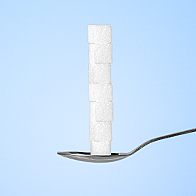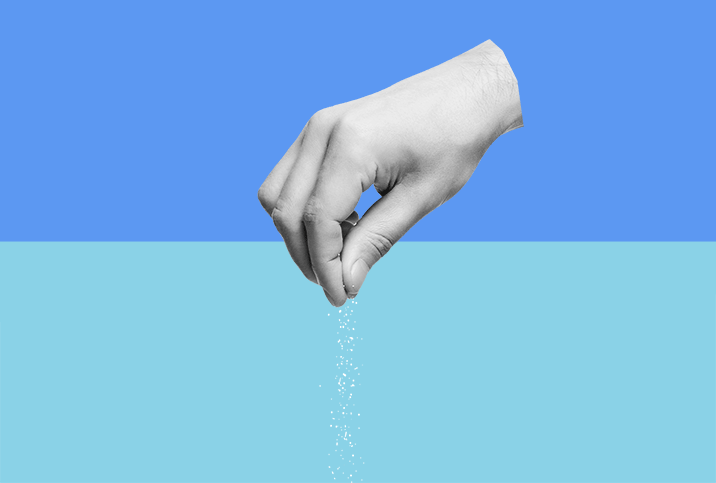Skip the Sugar Rush for Better Sexual Health

Ice cream, cake, cookies and all those seductive candy bars at the checkout line make it all too easy to satisfy our sugar cravings.
However, if you overindulge in sugary foods, you could be eating your way out of a robust sex life.
Sugar highs and lows
For some people, sugar makes everything taste great. More than making our lives sweeter, sugar provides fuel for our bodies and brains. Our brain's neurotransmitters need glucose energy to function and provide communication between cells. If our brain messaging system isn't working due to lack of sugar, we become cognitively impaired. This condition, commonly known as hypoglycemia, can cause a racing heart and may induce sweating and shaking.
Of course, a diet high in sugar can create more problems.
"Eating a diet high in sugar can lead to obesity, insulin resistance and other metabolic disorders, which can increase the risk of sexual dysfunction," explained Angelo Cignarelli, M.D., Ph.D., diabetologist, endocrinologist, andrologist and professor at the University of Bari Aldo Moro in Italy. "Excess sugar intake can…lead to the formation of advanced glycation end products in the body, which are harmful compounds that can damage blood vessels, nerves and tissues, including those involved in sexual function…High sugar intake can lead to inflammation and oxidative stress in the body, which can contribute to endothelial dysfunction, [which] impairs blood flow."
Putting the brakes on sugar
Researching treatments for patients with type 2 diabetes, Cignarelli and his team discovered that controlling blood sugar levels with glucose-lowering medications can improve blood flow and nerve function, which may improve erectile function. Recent diabetes medications have been found to have positive effects on blood vessels and nerve function and possibly help with ED, he said.
Women experience sexual dysfunction, including vaginal dryness, difficulty achieving orgasm and decreased libido, from high blood sugar levels because of type 2 diabetes, he added.
"The mechanisms underlying this association are similar to those in men and involve changes in blood flow, nerve function and the production of hormones and chemicals that affect sexual function," Cignarelli explained. "By controlling blood sugar levels, hypoglycemic agents can help improve blood flow and nerve function, which may improve sexual function.
"High sugar intake can potentially affect a person's sexual function even if they do not have diabetes," he added.
Of course, this means we all need to be more mindful of the foods we're eating.
"When working with individuals on body composition, my opinion has always been to keep your calories and activity within the range of your fitness goals," said Ashley Ranaldi, M.Ed., a nutritionist and fitness coach based in Massachusetts. "Sugar can come into play here because it is readily available and easy to overconsume. From a nutritional perspective, too much sugar added can raise insulin levels and create mood instability. This can impact sexual health in terms of sexual desire. In addition, increased sugar intake can increase risks for cardiovascular disease, diabetes and high blood pressure. The mere fact of feeling unwell due to these metabolic diseases can impact sexual health."
A more natural solution
Natural sugars in foods such as milk and fruits are the best sources of glucose, and are part of a healthy lifestyle.
"Sugar sourced from fruit has a very different impact on your body system," Ranaldi explained. "It often contains fiber, which slows the digestion of the sugar while utilizing its nutritional benefits. On a nutrition label, 'total sugars' may include a source like fruit but 'added sugars' refer to sugars like cane sugar, brown sugar and agave, to name a few. The dietary guideline for Americans suggests limiting your added sugars to 10 percent of your total daily calories."
It's these added sugars that are the culprits of overindulgence: white sugar, maple syrup, honey, presweetened yogurt, soda and the hidden sugars in processed foods such as bread and pasta sauce.
American adults eat 77 grams of sugar per day on average, far above the recommended amounts of 36 grams for men and 25 grams for women. These extra calories put a tremendous strain on our bodies to process the sugar, which can cause many health issues, including heart disease.
Checking in on your testosterone
"In general, a healthy and balanced diet is important for maintaining optimal sexual function," Cignarelli said. "[Limit your] intake of added sugars and refined carbohydrates and instead opt for a diet rich in whole foods, fruits, vegetables, lean proteins and healthy fats."
Recently, Cignarelli and his team published a clinical study that followed obese patients without diabetes on the low-calorie ketogenic diet.
"This is a high-fat, low-carbohydrate diet that has been shown to have various health benefits, including weight loss, improved blood sugar control and increased energy levels," Cignarelli explained. "We know that weight loss is associated with a rise in testosterone levels. We found a significant increase in testosterone levels at the end of the study. Almost half of this rise was observed after only one week of nutrition intervention [and accompanied by] a dramatic reduction of insulin levels, demonstrating that the ketogenic diet may also have positive effects on reproductive health, particularly in men with hypogonadism."
Hypogonadism, or low-T, is a condition that affects masculine growth and development.
"Keep in mind that sexual dysfunction can have many causes, and your healthcare provider can help determine the most appropriate treatment plan, including a new diet regimen," he added.
It's time to balance your diet
A healthy lifestyle must include balance.
"It is difficult to argue the physical response sugar has on the body and how it can impact the body's physical reactions," Ranaldi said. "However, life should not be too restrictive, and special treats can certainly add to the enjoyment of life—in moderation. If certain sweets are 'special' to an individual, I like to keep them in their diet."
This approach empowers a person to have control of their dietary choices, and they may have "a healthier relationship" with food in general.
And there may be causes for sexual dysfunction other than diet.
"I feel when it comes to a woman's sexual health, the mind and body connection could be most important," Ranaldi explained. "Yes, living in a diseased state due to excessive sugar could surely impact your sex drive, but the brain ultimately controls the sex drive. Someone could be sugar-free and physically in peak health, but if they don't have a good body image, attraction to their partner or they are experiencing emotional stress, their sexual health will suffer."
"It is important to keep in mind that sexual dysfunction can have many causes and to seek medical and psychological attention if sexual dysfunction is accompanied by other symptoms or is causing significant distress," Cignarelli added.
Healthy guidelines for better sexual health
Here are a few suggestions from Cignarelli for anyone who wants to keep sugar in their lives:
- Eat a balanced diet that includes whole foods, fruits, vegetables, lean proteins and healthy fats to support overall health.
- Maintain a healthy weight through diet and exercise to help improve sexual function.
- Manage stress by practicing stress-management techniques, such as mindfulness meditation or yoga.
- Reduce sugar intake. Added sugars and refined carbohydrates contribute to metabolic disorders that can affect sexual function.
- Regular exercise can help improve blood flow, reduce inflammation and support overall health.
Contact your healthcare professional to discuss creating your own personalized plan to cut down on sugar for better sex and better health.




















